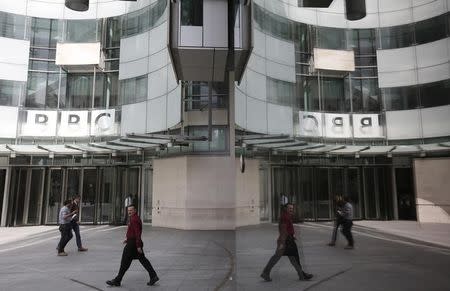Britain calls for more "distinctive" BBC in governance overhaul
By Paul Sandle and Michael Holden LONDON (Reuters) - The BBC will face external regulation for the first time in its 94-year history, the government said on Thursday, subjecting it to tighter scrutiny but stopping short of the heavy-handed intervention that some stars and programme-makers had feared. In a once-in-a-decade review of a treasured national institution, the government said the BBC must become more distinctive and avoid apeing its commercial radio and TV rivals. "We will place a requirement to provide distinctive content and service at the heart of the BBC's overall core mission of informing, educating and entertaining," Culture Secretary John Whittingdale told parliament. Known affectionately as "Auntie", the BBC reaches an estimated 97 percent of Britons every week and is admired around the world, especially for its news and drama. But critics say it is bloated, inefficient and wasteful of public money. Rivals say its guaranteed income of 3.7 billion pounds ($5.35 billion), derived from an annual licence fee of 145.50 pounds imposed on all TV-watching homes, distorts competition and gives it an unfair degree of dominance. The reforms will replace the governing body, the BBC Trust, with a new board of up to 14 people, to which the government will name six members but the BBC will be allowed to appoint the majority. External regulation will be handed to Ofcom, the communications watchdog which oversees commercial broadcasters, and it will assess the BBC's impact on the market with "proportionate powers to sanction". The BBC Trust has been severely criticised in the last few years. A report this year said the broadcaster was guilty of serious failings over the late Jimmy Savile, a former radio and TV star who was revealed after his death in 2011 to have been a prolific sex offender. "HYSTERICAL SPECULATION" Before the review, newspaper reports had suggested Whittingdale would tell the BBC to stop broadcasting some of its most popular shows that go head-to-head with commercial rivals at peak times, like the pre-Christmas favourite "Strictly Come Dancing". At the British Academy of Film and Television Arts (BAFTA) awards on Sunday, stars such as Oscar-winning actor Mark Rylance launched a passionate defence of the corporation, warning the government not to threaten its future. Whittingdale made light of such fears. "All the concerns ... were based on ill-founded, hysterical speculation by left-wing luvvies and others," he said, using a mildly mocking British term for actors. "In actual fact what the government propose has been widely welcomed by, amongst others, the BBC." Stars earning over 450,000 pounds a year will have their salaries published and parliament's spending watchdog, the National Audit Office, will audit the BBC's books to check it is providing value for money, the minister said. BBC Director-General Tony Hall said searching questions had been asked about the corporation's role. "That’s right and healthy, and I welcome that debate." Maria Eagle, the culture spokeswoman for the opposition Labour Party, said most of Whittingdale's "wilder proposals" seemed to have been dropped, suggesting he had been over-ruled by Prime Minister David Cameron. (Editing by Guy Faulconbridge)

 Yahoo Finance
Yahoo Finance 


